Your Plate’s Too Big and Your Spoon’s Too Small
the stages of grief when creative projects inevitably take longer than you planned
This post is free to read in its entirety, but it also contains a paywalled “before” sneak peak video walkthrough of the ground floor of my home which I am currently in the process of redecorating.
Things always take longer than you think they will.
They just do. It’s an indisputable fact of life. So why don’t we just learn and realistically plan enough time?
I don’t think this phenomenon of biting off more than we can chew is specifically a neurodivergent trait. But I do think that in our pure pure hearts (/s) hope springs even more eternal than in most, and that we are probably prone to it more than so-called neurotypical people1. Many would chalk this up to “time blindness”2 or impulsivity or an inability to make a plan and follow through in a methodical way—in other words, to executive dysfunction—in the face of which we are counseled, cajoled, and threatened into being more realistic, more efficient, more linear.
None of that ever works, of course. In fact it almost always backfires in a downward spiral: dysfunction is shamed and shame begets more dysfunction which begets more shame and on and on.
So what’s a body to do? I personally think it helps to have a sense of humor about these things so that shame doesn’t ossify into intractable and permanent failure, but rather a data-collecting, iterative sort of failure (note that failure is a feature not a glitch either way).
So in that spirit here is a (somewhat tongue-in-cheek) nod to Elizabeth Kübler-Ross in which I offer you the five stages of grieving the hard cold fact that everything takes longer than you expect (with my own current interior project as a case study):
Denial:
Look, denial is baked in. Denial about how much we can realistically pile onto our plates and denial about how big our spoons are is just part of the process, okay? Not accepting that fact is itself a form of meta-denial.
I personally don’t think there’s a realistic way to overcome this sort of eyes-too-big/spoons-too-small denial, and all the coaching and hacking and “accommodating” that boils down to “just be more realistic” is itself a form of denial.
I would prefer to recast this denial as exuberance, as vision, as sweet hopefulness—and those are good things! Don’t let anyone shame you into believing they are not.
In the case of my current interior design project, the denial goes waaaayyy back. Back to almost a year ago when I made a plan to repaint my whole downstairs (my ground floor is one big open plan room zoned into living room, dining room, and gym/art studio—if you’d like to see a short “before” walk through video it’s available below the paywall for paid subscribers). I poured over paint samples, swatched them all over my walls, finalized my color scheme, and ordered an eye-wateringly expensive amount of Farrow and Ball paint in the colors arsenic and calamine. My plan was to knock out the entire downstairs in the month of October.
Then one of my pacemaker’s leads poked a little hole in my heart and the unpleasant but tolerable fluttering sensations I had been experiencing since the first surgery five months prior became acutely painful and intolerable and we decided to do another surgery to extract and replace the lead. This was a major setback both physically as well as emotionally and psychologically, so it’s pretty easy to give myself a pass on not getting this project done in October.
But the surgery went extremely well, and by January I was feeling far more energetic than I had in a long time and … still the cans of paint sat lined up in my art studio andI just started working around them. I had basically stopped seeing the swatches of paint all over my walls, unless someone came over and then suddenly they were a bit embarrassing (but not shameful, because we don’t do shameful anymore, certainly not about our own homes, right?)
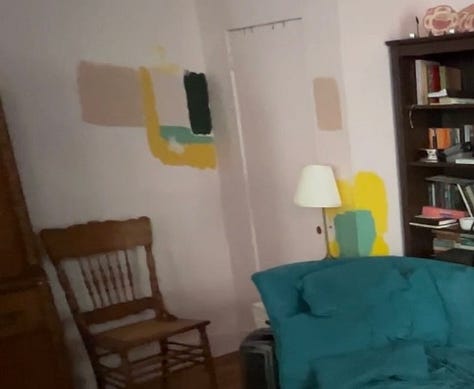
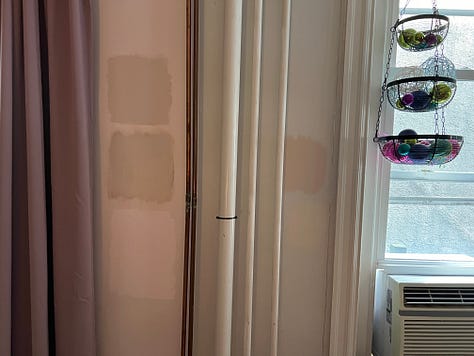
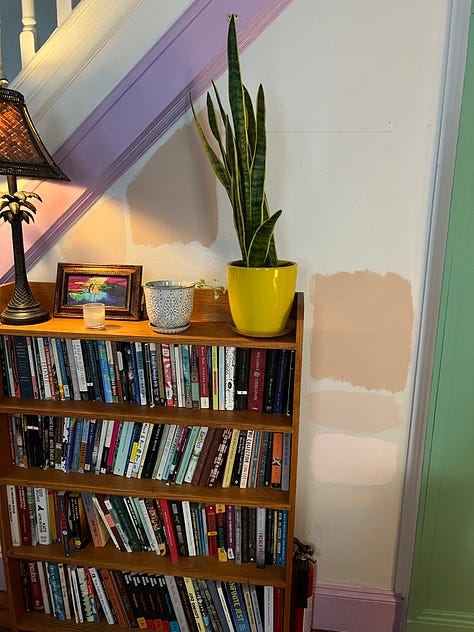
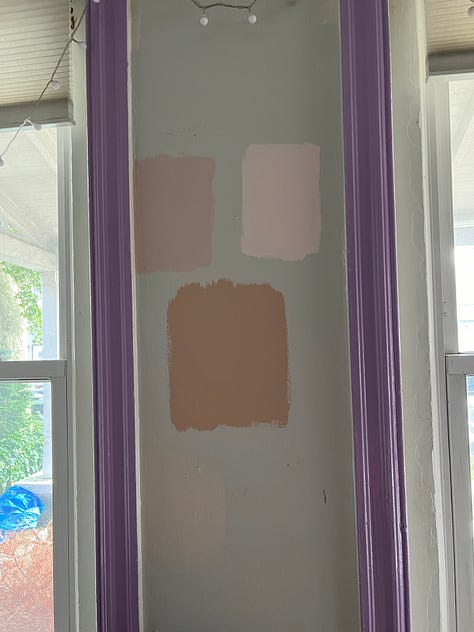
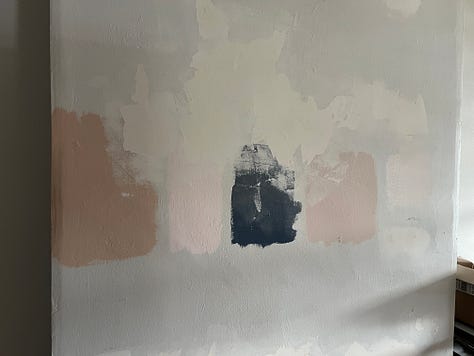
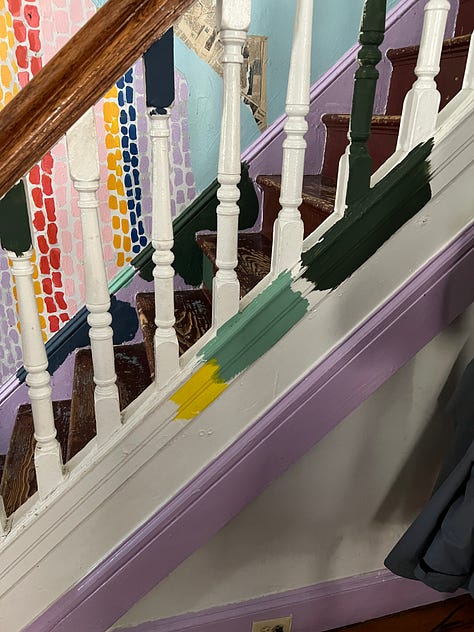
But then a few weeks ago, I let the spring of hope bubble to the surface again, and in what I thought was an entirely realistic (like patting-myself-on-the-back-for-being-so-realistic) goal, I told myself I would, in the two weeks before our scheduled camping trip, finish *just* the living room area of the whole downstairs. I would not be foolish and expect to finish the whole floor, just one little end of it!
And I would do this while also watching the Tour de France for 3 to 4 hours each day, writing weekly newsletters, and running DDS. No problem!
Like I said, the denial is just baked in. Resistance is futile.3 You will fill your plate with more than you can every hope to spoon into your greedy little mouth. And by “greedy” I mean exuberant! spontaneous! visionary!
The real stages of grief are in the peeling away of the unrealistic expectations you were in denial about in the first place:
Anger
I am prone to much less anger these days4, and especially less self-incrimination and reactivity, than I once regularly inflicted on myself, but if it’s going to pop up and get in my face and mock me for my incompetence and toomuchness, being in denial about how long things will take is the most fertile ground for it. Faced once again with an unrealistic, albeit self-imposed deadline that I am almost certainly not going to accomplish, it is easy for me to get angry and berate myself for being so unrealistic yet again.
You’re such an idiot! What’s wrong with you? Why can’t you ever get just be realistic???
This stage of dawning realization that I Will. Not. Finish when I hoped usually coincides with another also-inevitable phase of any big home renovation project: everything is a total mess, my tools are strewn everywhere, and I stomp and swivel around, unable to find anything I need right when I need it. When I have been mindlessly laying tools down wherever I happen to be when I no longer need them. So there’s a hammer on a stack of books in the dining room (because I’m painting the shelves and had to empty them); there’s a screw driver under a chair in Joel’s study (because….????); paint rollers tied up in plastic bags in the (totally illusory) hopes they won’t dry out before I need them; and inevitable, always, every damn time, paint brushes that get ruined because I think I’m just taking a tiny break that then turns into hours.
This was me a few days ago: overstimulated by the mess, and just generally kind of pissed off. The project is no longer fun and this is a stage that many times has ended in my throwing up my hands, muttering what’s the point anyway? and just leaving things mid-project until the naked light switches and random tools and other detritus just become invisible background noise. As my enthusiasm for the project turns to anger and self-recrimination, I stop seeing the mess, even while it continues to overstimulate my nervous system.
I think this is the critical stage for breaking out of toxic shame spirals and hopping into a design-thinking-inspired virtuous spiral. The more quickly you can spot the toxic self-talk and shame, the more possible it is to disrupt it. I find that talking to myself—sometimes literally out loud—like I would to a friend often helps. So does talking to an actual friend. Some people find freewriting in a journal or intuitive doodling in a sketchbook can externalize some of the anger and frustration and self-incrimination. I think it’s very difficult to break out of this stage while trapped entirely inside your own head. Community, creativity, friendship, peer support—these are all crucial to moving past this stage that so often sends us spinning out into emptiness, gasping for air.
Bargaining
The bargaining stage for me is often a continuation of the initial denial that got me into this predicament in the first place. This is where I think I’m already at the acceptance stage—I’ve worked through my anger and I’m no longer berating myself. I’ve calmed down, and resigned myself to the situation as it really is. I tell myself, “OK now, now I’m actually going to be realistic. And I start to bargain with everything on my plate.
I open my tool box—not the actual tool box, but the metaphorical one full of hacks and accommodations and gleaned wisdom. I give myself a good talking to: Yes, you really do need to slow down to get things done. No, you can’t actually skip meals and expect your body and mind to keep performing well. No, you won’t be able to maintain every other chore as usual and also finish this project. You really do just have to accept that the laundry may not get done, that you may have to order a pizza for dinner, that nagging administrative tasks might just have to nag on for awhile longer. You’re going to have to take a hard look at your tiny little spoon and your overfull plate and you’re gonna have to tell the plate, “Look, I can’t do everything, so I’m going to prioritize the creative project and let some other things slide, m’kay? I promise I’ll be back when this project is done. But by gum, I will meet this (arbitrary, self-imposed) deadline!”
To which the plate says, behind your back: mwahahahahaha!
Depression
The Depression stage is really just anger redux, but this time with a dose of resignation. In fact, I think I would call this stage Hang-Dog Resignation rather than full-blown depression.
This stage is really pre-acceptance: you have accepted that in fact, despite pulling out all your best debate team/moot court bargaining skills, there are just not enough things to scratch off your to-do list in favor of finishing your creative project by your [arbitrary, self-imposed] deadline. You have accepted this, but you are not happy about it. You’re not angry anymore, though, just …. hang-dog.
But even a dejected sort of acceptance can open up some space, can free something inside you. As is often the case, the reality we fear is not actually as terrible as we imagined (don’t get me wrong: sometimes it is, sometimes it’s even far worse, I do know that). For me, this pre-acceptance, hang-dog resignation stage allows me to really flush out any false hope on the road to true acceptance. No more grandiose denial (for this project, anyway—next project, all bets are off!). No more unrealistic expectations. Just resignation. Just feeling my feels. Just sitting with them for awhile.
Acceptance
Acceptance is not so different from Hang-Dog Resignation, it’s just more like relieved resignation that eventually spills over into gratitude for the insight that it really is possible to be an artist, to actually make shit, without completely contorting our quirky, lovely bodyminds into someone else’s idea of what creating should look like. This isn’t a shameful, I’m-such-a-failure resignation, and it certainly isn’t an I’m-incompetent-and-I-quit! sort of resignation. For me, getting to this phase has taken a lot of spins around this particular spiral, a lot of honest self-observation and iteration of my own process, but eventually, I have come to realize that this phase isn’t any sort of resignation at all, it’s true acceptance. Not just that this project won’t be done when I hoped, but true acceptance—celebration even—that I am the sort of person who jumps chaotically into projects with absurd, wild enthusiasm and delusional denial about how much I can actually accomplish. That I am the sort of person who can not just tolerate but also learn from disappointment and failure. That I can use that data to regroup and—this is what’s new and recent—not just quit in a fit of self-recrimination. I can find a place of slow, calm stillness, of contentment even. Even knowing full well that I will do it all over again, and truly embracing that this is my process, this is me.
Below, for paid subscribers, a detailed video walk-through of my downststairs—after the October 2023 paint swatches, but before I began this latest stage of the project. I usually forget to take “before” photos and video, which certainly makes the “after” images much less dramatic, so in this video I was really trying to get at every nook and cranny, every pile of mess, every cluttered surface.




